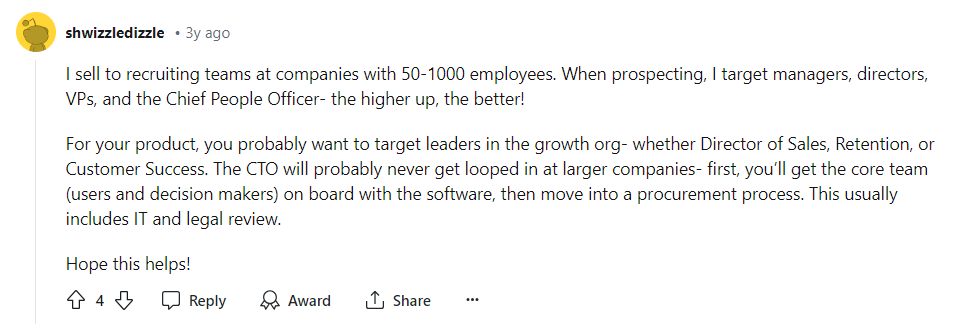Have you spent weeks tracking the right person to pitch your B2B product or service, but it has still backfired?
It’s sheer agony, isn’t it?
All B2B sales reps and managers know this pain, and so do we!
All your efforts get wasted if you fail to reach and connect with the main business decision maker. These professionals hold the power to give the final nod to your proposals. However, B2B business decision makers come in all shapes and sizes.
According to Blue Ridge Partners, 71% of reps said finding and engaging the right decision makers is the most challenging part of cold calling.
So, first, ensure that you understand their role in an organization. It will allow you to build relationships and tailor your sales pitch approach.
Who are Business Decision Makers?
Decision makers are entrusted with the authority and responsibility to make strategic decisions for an organization. Their role involves executing business initiatives, such as expansion, acquisitions, and investments, with the best interests of the company in mind. Their analytical decisions are instrumental in accelerating business growth.
These individuals usually hold C-level, VP, head, and deputy roles in B2B companies. The key titles and positions include:
- Founders
- Chief Executive Officer (CEO)
- Chief Marketing Officer (CMO)
- Chief Operating Officers (COO)
- Chief Financial Officer (CFO)
- Chief Information Officer (CIO)
- Board of Directors
- President/Vice President
- Project Managers
- IT Directors
Decision makers are entrusted with the authority and responsibility to make strategic decisions for an organization. Their role involves executing business initiatives, such as expansion, acquisitions, investments, and hiring global talent, with the best interests of the company in mind. Their analytical decisions are instrumental in accelerating business growth.
Key Roles of Business Decision Makers
- Understanding the company’s goals and objectives
- Offering valuable market insights and trends
- Directly impact an organization’s budget implications and bottom line
- Ensuring their decisions are implemented correctly throughout the departments
- Creating strategic partnerships with other businesses
- Assuring the company’s offerings meet various compliance and regulations.
Types of Decision Makers
You must take the time to understand the behavior of decision makers, as this is key to shaping your sales strategies. They are the ones worth focusing on.
You’ll generate leads from cold emails more often by knowing your Ideal Customer Profile (ICP).
Analytical
The meticulous decision maker relies on data for thorough analysis. They evaluate multiple scenarios before making a final call to reduce the risk of neglecting critical factors.
Their highly logical traits make them more receptive to qualitative arguments.
Visionary
Also known as champions of radical change, these business decision makers have a natural gift for leading people through tough times.
Thus, these professionals believe in problem-solving. They depend on both intuitive and logical thinking processes to look for solutions.
Adaptive
These decision makers are flexible, and open-minded, and thrive amidst chaos. They easily manage trends and cycles by objectively examining the facts.
Such individuals are often people-friendly and consider the perspectives of their team before making a decision.
Motivator
These types of decision makers are charismatic, lively, and results-oriented. They prefer the use of storytelling to convey an idea to inspire others to act.
Multifocal
These decision makers concentrate majorly on goals and outcomes. They aim to boost revenue and brand identity by trying new ideas through trial-and-error marketing techniques.
Hence, they are always ready to acquire skills and experiment with business models to enhance operations.
How to Reach an Ideal B2B Business Decision Maker?
Recognizing the right decision maker is like looking for a needle in a haystack. One of the first things you must do is figure out where and who to pitch. Check out the critical variables to spot the right business decision makers for B2B sales prospecting.
Assess Company Structure
First, map the organization to get a clear picture of the decision makers. Whom you should approach depends on the company size. So how does it typically work?
| Company Size | Key Decision makers |
| 0-10 employees | Look for the CEO or a co-founder |
| 10-50 employees | Pitch to VPs |
| 50-500 employees: | Connect with professionals with specialized positions like business management manager or sales manager |
| 500+ employees | Search for regional-specific roles like California rep or London rep |
The decision making process is usually faster in companies with a limited workforce. On the contrary, closing deals will be tougher in large companies as many decision makers are involved. Gartner reported that an average of 7 people make major buying decisions in a company.
So, map out the organization to find an ideal business decision maker for your proposal. Figuring out the company dynamics can help you craft B2B email campaigns tailored to your prospect’s needs and behaviors.
GrowMeOrganic’s B2B contact database enrichment tool is perfect for it offers valuable insights into a company profile, including industry, headcount, location, and domain.
Besides, the tool’s advanced job title filter lets you find specific high-profile prospects who fit your buyer persona, such as CEOs, CMOs, CTOs, or COOs.
Connect with Gatekeepers
Gatekeepers at large-scale companies are the bridge between decision makers and sales reps. Make them your first point of contact to keep your offer in front of key business decision makers.
So who are the gatekeepers?
They include a secretary, assistant, executive assistant, and junior manager.
Ask them relevant questions, build a relationship, and present an idea. After all, they know what clicks with their decision maker the best. Always aim to bring gatekeepers on your side.
As a Reddit user suggested, reaching the CTO directly at high-scale companies with 50-1000 employees isn’t easy. Instead, interacting with gatekeepers first will help connect with the key decision makers.

That said, first develop trust with them before pitching your product or service to an actual business decision maker.
Referrals and Introductions
What’s more? You may also find one of your old clients or colleagues as a mutual connection in the company that’s on your radar.
They may introduce someone or share employee contact information to connect you with the decision maker.
Often, business decision makers rely on peers and colleagues when making purchasing decisions. So, ask a trusted peer for feedback and referrals.
Positive testimonials and success stories instill confidence among targeted prospects to consider your offering.
Use Linkedin
LinkedIn is a goldmine.
You can map out your target company’s LinkedIn profile to find who is responsible for making business decisions.
Use LinkedIn Premium and Sales Navigator features to expand networking and lead research opportunities. As per a study, 84% of Vice Presidents and C-level executives use social media to make purchasing decisions.
Sales Navigator’s advanced filters will allow you to search for people with decision making power who fit your target clients.
Once found, use LinkedIn’s InMail feature to message gatekeepers or critical decision makers directly.
Leverage Tools
Don’t forget to use B2B email generation software designed to find the contact info of qualified decision makers. These prospecting tools feature an advanced filtering option to generate bulk emails within seconds. This time-savvy approach will help you avoid connecting with the wrong person.
For instance, install GrowMeOrganic’s Email Finder tool to extract contact details of individuals holding key positions within a particular organization.
Simply add the prospect’s or company’s name to get the correct email address within a few seconds.
4 Parameters to Engage B2B Decision Makers
A multi-faceted B2B sales funnel will boost your chances of success in connecting with business decision makers and winning deals.
Stick to these parameters to convert a prospect into a buyer efficiently.
Create a Buyer Persona
A buyer persona refers to an ideal decision maker based on the company’s headcount, industry, interests, pain points, demographics, budget, and buying habits.
It is crucial you understand buyer personas else you can create cold email campaigns properly.
That said, find who they are.
- What challenges do they face?
- What are they looking for?
- Which businesses have a real need for your offering?
Focusing on quality conversations over quantity will make a difference while targeting your outreach.
Personalized Outreach
After understanding the customer persona, go for targeted email communication based on individual interests.
A B2B business decision-maker will talk to you when you add value to your proposal. Instead of feature selling, focus on the value proposition your product offers, such as risk reduction, growth enablement, financial incentives, or productivity depending on whether you are planning to send an investment proposal or business proposal.
Here’s an example of a solid personalized approach:
“Hello, I saw your post that you’re looking for a better employee lifecycle solution. We have a product that helps companies like yours keep track of payroll information and improve the hiring process by screening qualified candidates 75% faster. Before you look at another application, I’d like to discuss our product and how I can help you streamline your HR management.”
According to an Adobe study, conversion rates grew by 67% through personalized initiatives. So, tailor your offer to the needs and values of the individual you’re approaching.
Use Thought Leadership Content
Decision makers love to stay updated with market trends, fresh insights, and valuable information. Research indicated that 88% of these professionals value thought leadership content.
So, position yourself as a thought leader rather than a pushy salesperson.
To build your market credibility, create high-quality, educational, and informative content. Publish case studies, whitepapers, and blog posts highlighting your industry expertise.
The content must also address decision makers’ pain points and challenges. This approach will make your targeted clients more receptive to your outreach efforts.
Build Relationships
Let’s face it – you’ll get close to business decision makers gradually. Attend industry conferences and events.
Or engage in online communities where high-profile professionals actively participate.
Keep the communication channel open through regular updates and follow-ups. When you nurture the relationship, the chances of targeted decision makers approaching you for future opportunities will probably increase.
Bottom Line
GrowMeOrganic’s B2B Email Finder makes hunting target decision makers seamless with its filters. The automated bulk email extraction tool will accelerate your outreach process.
Once you know your ICP, identifying businesses and decision makers will be straightforward. However, persistence is key to engaging individuals in higher positions.
Before selling to the company, you’re talking to a person responsible for critical business decision making.
So, take a proactive approach to do the groundwork to pitch your B2B product appropriately. Catering to specific needs creates deeper connections with business decision makers while improving conversion rates.
FAQs
1. Who is responsible for decisions in a company?
The company’s primary decision makers are the C-suite, board members, senior executives, and managers. Every organization follows a well-defined structure to manage each department’s operations, needs, and challenges.
2. What are the four basic decision making styles in organizations?
Company leaders use one of the four decision making styles, i.e., analytical, behavioral, conceptual, or directive. The strategies differ based on the company’s current situation and future goals.
3. How to pitch decision makers?
Consider these tips when planning to approach B2B decision makers in any industry.
- Research the company structure and key decision makers.
- Prepare your outreach approach based on the buyer person.
- Engage with gatekeepers.
- Ask for referrals (if any).
- Use LinkedIn and email finder tools to find and connect with B2B decision makers.
- Personalize cold email outreach campaigns.
- Follow up and stay connected to build long-lasting relationships with decision makers.
4. Who makes strategic decisions?
The board of directors, shareholders, C-level executives, and managers are all critical parts of the strategic decision making process in every organization.
About Post Author
Anant Gupta
Growth Hacker, Marketing Automation Enthusiast & Founder of GrowMeOrganic







